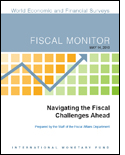
Ten Commandments Blog
PFM Blog
Contacts in FAD
Previous newsletter
IMF Publications
- Fiscal Monitor May 2010
- From Stimulus to Consolidation—Revenue and Expenditure Policies in Advanced and Emerging Economies
IMF Working Papers
- Automatic Stabilizers and the Size of Government: Correcting a Common Misunderstanding
- Public Debt and Growth
- Public Investment as a Fiscal Stimulus: Evidence from Japan’s Regional Spending During the 1990s
- Fiscal Policy and the Current Account
- Subnational Health Spending and Soft Budget Constraints in OECD Countries
- Tax Revenue Downturns: Anatomy and Links to Imports
- Treasury Single Account: Concept, Design, and Implementation Issues
External Publications
more... Technical Notes
and Manuals
- Extrabudgetary Funds
- Conceptual Design: A Critical Element of a Successful Government Financial Management Information System Project
- Role of the Legislature in Budget Processes
- Revenue Administration: Taxpayer Audit—Use of Indirect Methods
- Revenue Administration—Development of Effective Plans
- Revenue Administration: Tax Administration in Small Economies
- Revenue Administration: Functionally Organized Tax Administration
- Autonomy in Tax Administration and the Revenue Authority Model
- Revenue Administration: A Toolkit for Implementing a Revenue Authority
Latest Fiscal Monitor
Fiscal Forum
The Ten CommandmentsIn a blog that has received world-wide attention (see also the “Fiscal Affairs Department in the News” column in this Newsletter), IMF Research Department Director and Economic Counselor Olivier Blanchard and Fiscal Affairs Department Director Carlo Cottarelli offer advice to advanced economies on how to design fiscal strategies that are consistent with the continuation of the current economic recovery and with long-term growth prospects. To achieve this dual goal, Blanchard and Cottarelli’s “Ten Commandments” include clarity of intent, an appropriate calibration of fiscal targets, and adequate structural reforms. Policy Paper: “From Stimulus to Consolidation—Revenue and Expenditure Policies in Advanced and Emerging Economies”Tools for consolidating fiscal accounts in advanced and emerging economies are explored in more depth in a recent policy paper by the Fiscal Affairs Department entitled “From Stimulus to Consolidation—Revenue and Expenditure Policies in Advanced and Emerging Economies.” On the spending side, the focus is on pension and health care reform, public wages, untargeted social spending and subsidies, and military spending. On the revenue side, particular attention is given to measures that could raise revenues by reducing existing distortions in the tax system. 18 Sub-Saharan African Countries Represented at Petroleum Tax Conference
International Award to Fiscal Affairs Department Staff
New Working Papers |
|
|
|
In a working paper entitled “Automatic Stabilizers and the Size of Government: Correcting a Common Misunderstanding,” Carlo Cottarelli and Annalisa Fedelino argue that the ratio of government spending to GDP—often used in the literature on the stabilizing effects of fiscal policy—is not the right proxy for the size of the automatic stabilizers. A more appropriate measure is the revenue to GDP ratio. In “Public Debt and Growth” M.S. Kumar and J. Woo explore the impact of high public debt on potential economic growth. The empirical results suggest an inverse relationship between initial debt and subsequent growth, controlling for other determinants of growth: on average, a 10 percentage point increase in the initial debt-to-GDP ratio is associated with a slowdown in annual real per capita GDP growth of around 0.2 percentage points per year, with the impact being somewhat smaller in advanced economies. There is some evidence of nonlinearity with higher levels of initial debt having a proportionately larger negative effect on subsequent growth.
New Technical Notes and ManualsNew additions to the series of Technical Notes and Manuals prepared by the staff of the Fiscal Affairs Department include:
Technical Assistance ActivitiesBetween April and June 2010 FAD provided technical assistance to 50 countries on a broad range of fiscal issues. FAD technical assistance typically comprises missions led by IMF staff with the participation of international experts in specialized fields. Examples of recent FAD activities include: four missions to Greece, including one on revenue administration, two on public financial management, and one on expenditure rationalization, in support of the country’s fiscal consolidation program; one mission to China on VAT reform; three missions to Mongolia on decentralization and intergovernmental relations, the fiscal regime of mining, and strengthening large taxpayer administration; one mission to Pakistan on its financial accounting and budgeting system; and two missions to Togo on the petroleum product pricing mechanism and the modernization of revenue administration. |
||
Copyright © 2010
International Monetary Fund
All Rights Reserved
 The May 2010 issue of the
The May 2010 issue of the  The first
The first  A conference on “
A conference on “ Michael Keen, Assistant Director in the Fiscal Affairs Department, has received this year's Musgrave Prize. This is awarded annually by the International Institute of Public Finance and CESifo in recognition of distinguished contributions to the field of public finance. Accepting this honor in Munich on July 7, Keen delivered a
Michael Keen, Assistant Director in the Fiscal Affairs Department, has received this year's Musgrave Prize. This is awarded annually by the International Institute of Public Finance and CESifo in recognition of distinguished contributions to the field of public finance. Accepting this honor in Munich on July 7, Keen delivered a